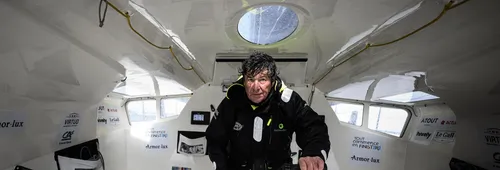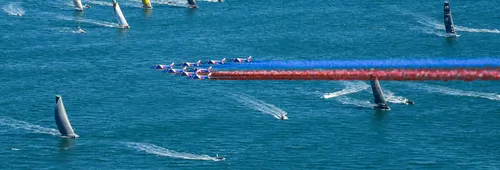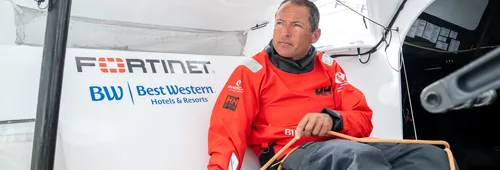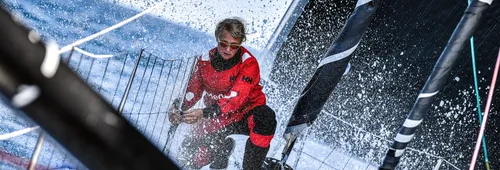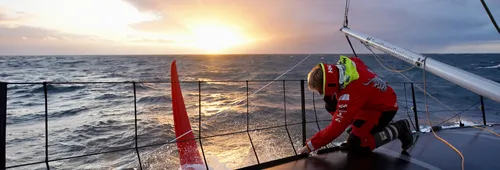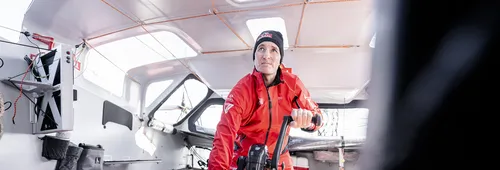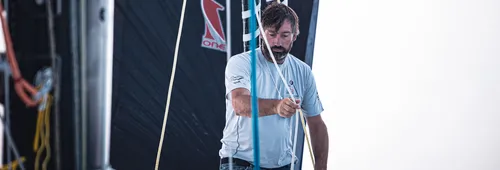Fabrice Amedeo: “Success would be completing a second round the world race as well as all my non-sporting projects”
THE SKIPPERS SAID (34/40). After his first Vendée Globe which he completed in a good 11th place after which had always imagined returning to his life as a journalist within the editorial staff of Le Figaro, Fabrice Amedeo continues to prove that believing in your dreams and pursuing them with a lot of determination can transform your life.
Such was the intensity of his first race that he turned his back on any return to full time journalism and instead carried on with his career as a professional IMOCA skipper. He returned to the Vendée Globe in 2020-2021 but it was a bittersweet experience. Amedeo had to retire after 33 days of racing due to multiple failures but most of all his main computer died.
And so the Vendée Globe is very much unfinished business. His programme was devastated in 2022 when his boat went on fire during the early stages of the Route du Rhum. He lost his boat and had to be rescued. But showing remarkable resilience he came back with a different boat, the Owen Clarke design which was launched as Mike Golding’s Ecover 3 to which Arnaud Boissières added foils.
Since then the priorities of the skipper of Nexans – Wewise have changed. Now, it was above all a question of successfully completing the full course a second time as well as delivering on his program of oceanographic measurements and his collaboration with the scientific community.

Vendée Globe :
After a first Vendée Globe, in 2016-2017, which was supposed to be a career break from your life as a journalist, you finally put together a project for the 2020-2021 edition, and here you are again at the start. What place has the event taken in your life?
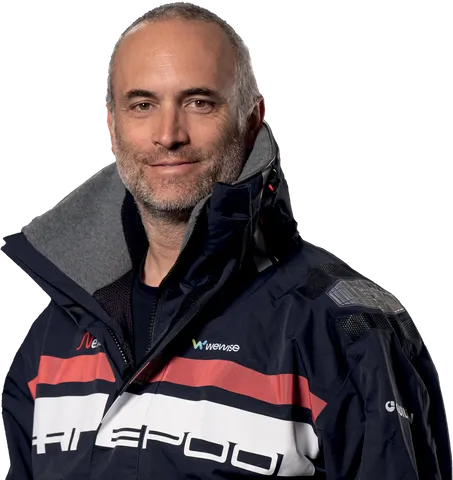
Fabrice Amedeo
"After my first Vendée Globe, I wasn't necessarily planning on going for a third, time, but since the second wasn't a success, it was obvious to me to carry on to complete this quest to succeed in a second complete round the world race, but also all my non-sporting projects, in particular the measurements in the Southern Ocean. So there is a double attraction for a sailor to do a Vendée Globe and this desire to be useful and to go and collect data for scientists. There is also the project, which came a little later, to go around the world without using fossil fuels, which gives meaning to my overall project. All this, against the backdrop being wrecked in 2022, after which I recovered an old boat. From then on, I put all sporting ambitions on hold and the whole extra-sporting project that carries the values in which my partners find themselves, is prioritised more.”
Vendée Globe :
Can you tell us a little more about this scientific program that you are carrying?
"Since 2019, different sensors have been installed on board my boat. This is the Ocean Pack which measures CO2, salinity, temperature. The work is carried out in collaboration with IFREMER, in France, then GEOMAR and the Max Planck Institute, in Germany. All the data collected is put on an international database called SOCAT, and allows scientists to better understand the consequences of global warming on the ocean. In 2020, we added a microplastic sensor and, along the way, we realized that it filtered other particles, in particular cellulose fibers from the textiles of our washing machines. IFREMER, the University of Bordeaux and the IRD share the work of analysis, interpretation and modelling of the results. The aim of this component is to better understand the anthropogenic pollution affecting our oceans. I will set off on this Vendée Globe with 90 sets of filters for around 90 days at sea, with three analysis sizes: 300, 150 and 30 microns. Since 2022, in partnership with the Cawthron Institute in New Zealand, an environmental DNA sensor has also been on board. This allows us to measure the presence of biodiversity in the oceans that I will cross. Our boats go to regions where scientific boats do not go. They are very interested in having data in the Southern Oceans. I want to raise awareness of this work among the public and also among children. This is how the educational project was born. A project which, after a season 1 four years ago, is now experiencing a season 2 with a booklet published for schoolchildren in cycles 2 and 3 and produced in partnership with with the National Education Sea Foundation that validated all the content. This one, called "L'Echos des Océans" always talks about preserving the oceans, but also about the energy transition."
Vendée Globe :
And so you have also chosen to do this round the world without using fossil fuels. Why?
"To go even further. In general, on a Vendée Globe, we take 250 liters of diesel. If I stayed on land this winter, I would have consumed more fossil fuels with my car. So it's really a symbol, but I think that high-level sport is also there to share the message. To highlight causes. It carries a message about the energy transition and economising on energy My boat is equipped with 10 m² of solar panels. So I'm going to go around the world by recharging my batteries 80% with solar energy and 15-20% with hydro generators."
Vendée Globe :
What lessons have you learned from your first two Vendée Globes?
"My relationship with the Vendée Globe is quite mixed. My first, in 2016-2017, was a success, it was light, an exceptional personal adventure, a lot of pleasure and the success of finishing in 11th position even though sixteen months before starting the race, I had never been on an IMOCA in my life. The second in 2020-2021 was a failure, real darkness. My race lasted four hours. I came back to repair the mast. I set off again but then I never really managed to get back on track, to be on target with my objectives. The descent of the Atlantic was a real pain and then when I reached South Africa, my entire computer system crashed and so I had to make that decision to abandon."
Vendée Globe :
What do you think makes you strong today?
"Among other things I've been shipwrecked. I got out of a very difficult situation. I almost died three times in the same day. When you succeed like that, you're capable of achieving great things and it gives me a lot of confidence to tackle a new Vendée Globe."
Vendée Globe :
What do you fear the most?
"Like everyone else, abandoning. The Vendée Globe is a bit like us sailors’ Olympic Games. It's every four years and it's a lot of work. Finishing a Vendée Globe is a massive accomplishment anyway. Abandoning is the worst-case scenario. Even finishing last is much better, for me, than stopping after a great start to the race."
Vendée Globe :
What is the first image that comes to mind when you think of the race?
"Cape Horn. When you round it, you haven't finished the round the world race but you are still in a good position to return home. You have done the hardest part. Besides, during my first Vendée Globe, I wasn't thinking about the finish but only about going to get this mythical cape."
Vendée Globe :
Your best memory at sea?
"The finish of my first Vendée Globe. I crossed the line on a Saturday morning during the school holidays, in anticyclonic conditions. The light was beautiful and the sea relatively flat. I had a truly magnificent finish, with a great many people from Les Sables present. All my partners were there. It couldn't have been better."
Vendée Globe :
Your best moment on this boat?
"The Transat Jacques Vabre 2023, with the German sailor Andreas Baden. It was the first race on the boat. As it wasn't ready, we couldn't make it work as we wanted, but the beautiful human story took precedence over technical frustrations. I had a great encounter. Ocean racing is about great experiences alone but also sometimes great encounters during double-handed races."
Vendée Globe :
Your wildest dream for this Vendée Globe?
"It would be for there to be a difficult race scenario where adventure takes precedence over the competition and that I do well."
Vendée Globe :
The sailor who inspires you the most?
"I have several because I have met many great people throughout my career. Recently, I discovered Vincent Riou. He has been to sail several times on my previous boat and he followed the choice of this new boat as well as its renovation. I find him to be an inspiring person. He is very sharp in all his analyses. He is really driven by passion and I find that admirable."
Vendée Globe :
What do you do when you are not sailing?
"I go cruising. I love spending time with my family on a boat. We have been able to go on some very nice cruises in French Polynesia, Corsica and the Balearic Islands in recent years. I also go scuba diving with my eldest daughter. It's really great to share that. We have done some great dives in Polynesia but also in Brittany. On wrecks, it's really passionate."
Vendée Globe :
La chose qui ne te quitte jamais lorsque tu pars en course ?
« Il y a trois ans, ma petite dernière, Garance, a ramassé un petit caillou sur la plage. Elle me l’a offert en me disant qu’il me porterait bonheur. Depuis, je l’emmène tout le temps en mer. Il est revenu du naufrage dans ma poche et il ne me quitte jamais. »

